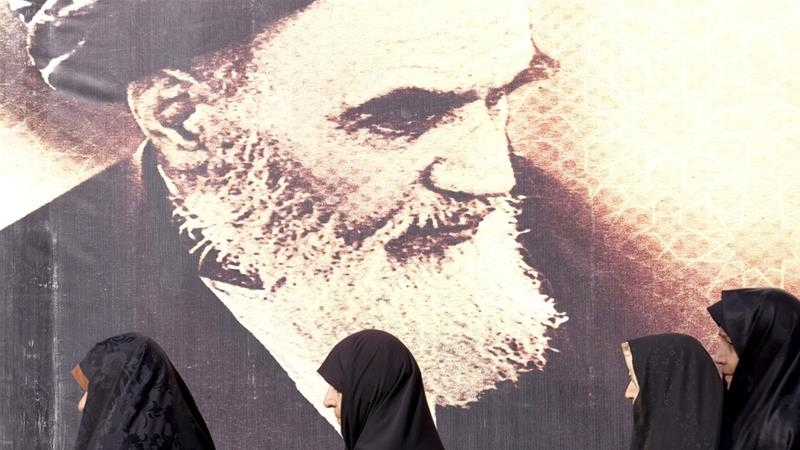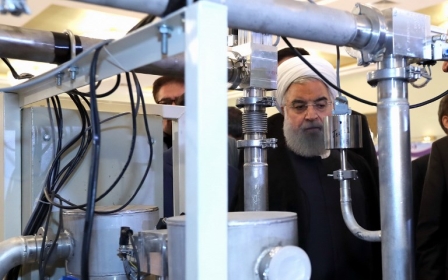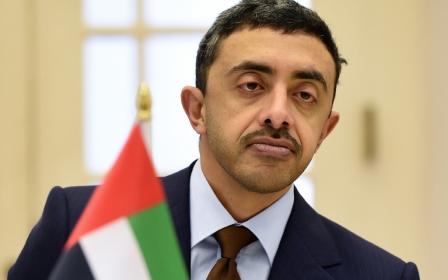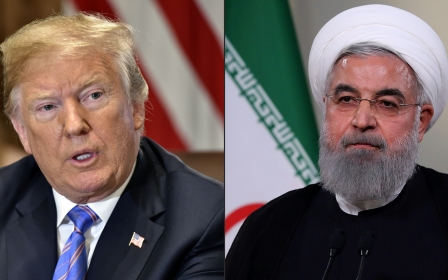Iranian press review: The black comedy of Trump's sanctions on Iran's late leader

Iranians mock Trump for sanctioning Khomeini
The new set of US-imposed economic constrains against Iran should not have been a laughing matter for a nation debilitated by economic sanctions. However, the White House's decision to target the long-deceased founder of the Islamic Republic in its latest round of sanctions drew jokes and laughter.
In a video posted by the White House, Trump announced that “the assets of Ayatollah Khomeini and his office will not be spared by the sanctions”. Ayatollah Ruhollah Khomeini was the founder of the Islamic Republic and the country’s first supreme leader, who died in 1989.
While some Iranians interpreted Trump’s speech as reflective of the lack of basic knowledge which shapes the foreign policy of the current US administration towards the region, others argued that Khomeini's inclusion in the sanctions was neither a mistake nor a gaffe, but that Trump’s economic sanctions have expanded to include dead people.
One Iranian Twitter user offered: “Trump sanctioned Imam Khomeini, most probably in his next move he will sanction Prophet Suleiman [Solomon] instead of General [Qasem] Soleimani.”
New MEE newsletter: Jerusalem Dispatch
Sign up to get the latest insights and analysis on Israel-Palestine, alongside Turkey Unpacked and other MEE newsletters
Another user tweeted: “It’s only my father and I, and the neighbours’ kid who have not been sanctioned yet. I urge the ministry of foreign affairs to send our details to Trump to provide him new names for the next round of sanctions, which will take place after we down another US drone.”
Meanwhile, critics of President Hassan Rouhani seized the opportunity to denounce him for having put effort into negotiations that led to the 2015 nuclear deal. A particular target was Iranian Foreign Minister Mohammad Javad Zarif.
“The one who denounced [former president Mahmoud] Ahmadinejad to please the US is now himself on the list of US sanctions. A list on which Ahmadinejad’s name has never appeared. Not only did you [Zarif] waste our national resources [on the negotiations], but also lost your own personal credibility," Abdolreza Davari, a conservative economist, wrote on Twitter.
Bring US back to nuclear deal, urge former political prisoners
A group of former political prisoners and reformist activists called on Antonio Guterres, the secretary-general of the United Nations, to persuade the US to return to the 2015 nuclear deal with Iran, the Arman daily reported.
“The nuclear agreement had had a great impact on reducing regional tensions and the dangers of a new war in this part of the world,” read an open letter written by the group.
The letter stressed that the UN should play a more active role to keep the nuclear deal alive.
“Now, while Iran is still complying with its obligations, the US government has unilaterally withdrawn from the agreement despite its commitments, and has imposed worse sanctions on Iran,” continued the letter.
“This attitude establishes a new era in our world, in which international agreements and charters will have no credibility.”
Conservatives mount pressure on Rouhani
In the wake of the US's unilateral withdrawal from the 2015 nuclear deal, Iranian hard-liners have demanded that President Rouhani not join any international accords, especially the Financial Action Task Force (FATF).
The intergovernmental group targets money laundering and terror financing among its member states, but critics believe FATF would leave Iran exposed to further US pressure and financial bullying over international banking transactions.
The Kayhan daily, the mouthpiece of conservatives in Iran, asked: “What has the government [of Rouhani] gain from the nuclear deal, that it now wants to join the FATF?”
In 2016, Iran agreed to take measures to meet FATF standards, however the conservative Guardian Council stopped these steps in 2018 as a reaction to US withdrawal from the nuclear deal and the EU’s inability to meet its commitments under the deal.
“Now that the European parties of the nuclear deal have clearly said that they cannot keep their commitments, why is Mr President insisting on passing the bills to meet FATF standards?” Kayhan continued.
Officers suspended for violent arrest
A police officer and a deputy chief of police in the east of Tehran were suspended after a video of a teenage girl being manhandled and dragged into a police car went viral on social media.
Following widespread anger among Iranians over the video, 30 legislators asked the minister of interior to explain why the police treated the young girl with violence and without a female police officer present.
On 25 June, ISNA news agency reported that three men and two women had been arrested in the incident, accused of “refusing police orders, taking off hijab and violating norms”. However, unofficial sources reported that the five teenagers involved were playing in the park, before being arrested by the police.
Iranian lawyer Nemat Ahmadi explained to the Arman daily that the way in which police dealt with that situation was “a criminal act from the beginning till the end”. Ahmadi said that “according to law, police were not supposed to have intervened in such an incident at all.”
Middle East Eye delivers independent and unrivalled coverage and analysis of the Middle East, North Africa and beyond. To learn more about republishing this content and the associated fees, please fill out this form. More about MEE can be found here.




